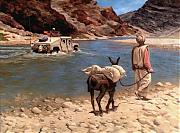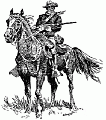Introduction
Your company has just been warned for deployment on counterinsurgency operations in Iraq or Afghanistan. You have read David Galula, T.E. Lawrence and Robert Thompson. You have studied FM 3-24 and now understand the history, philosophy and theory of counterinsurgency.
You watched Black Hawk Down and The Battle of Algiers, and you know this will be the most difficult challenge of your life.
But what does all the theory mean, at the company level? How do the principles translate into action - at night, with the GPS down, the media criticizing you, the locals complaining in a language you don't understand, and an unseen enemy killing your people by ones and twos? How does counterinsurgency actually happen?
There are no universal answers, and insurgents are among the most adaptive opponents you will ever face. Countering them will demand every ounce of your intellect. But be comforted: you are not the first to feel this way. There are tactical fundamentals you can apply, to link the theory with the techniques and procedures you already know.
What is counterinsurgency?
If you have not studied counterinsurgency theory, here it is in a nutshell: this is a competition with the insurgent for the right and the ability to win the hearts, minds and acquiescence of the population. You are being sent in because the insurgents, at their strongest, can defeat anything weaker than you. But you have more combat power than you can or should use in most situations. Injudicious use of firepower creates blood feuds, homeless people and societal disruption that fuels and perpetuates the insurgency. The most beneficial actions are often local politics, civic action, and beat-cop behaviors. For your side to win, the people do not have to like you but they must respect you, accept that your actions benefit them, and trust your integrity and ability to deliver on promises, particularly regarding their security. In this battlefield popular perceptions and rumor are more influential than the facts and more powerful than a hundred tanks.
Within this context, what follows are observations from collective experience: the distilled essence of what those who went before you learned. They are expressed as commandments, for clarity - but are really more like folklore. Apply them judiciously and skeptically.
Preparation
1. Know your turf...
2. Diagnose the problem...
3. Organize for intelligence...
4. Organize for interagency operations...
5. Travel light and harden your CSS...
6. Find a political / cultural adviser...
7. Train the squad leaders - then trust them...
8. Rank is nothing, talent is everything...
9. Have a game plan...
The Golden Hour...
10. Be there...
11. Avoid knee jerk responses to first impressions
12. Prepare for handover from Day One...
13. Build trusted networks...
14. Start easy...
15. Seek early victories...
16. Practice deterrent patrolling...
17. Be prepared for setbacks...
18. Remember the global audience...
19. Engage the women, beware the children...
20. Take stock regularly...
Groundhog Day...
21. Exploit a "single narrative"...
22. Local forces should mirror the enemy, not ourselves...
23. Practice armed civil affairs...
24. Small is beautiful...
25. Fight the enemy's strategy, not his forces...
26. Build your own solution - only attack the enemy when he gets in the way...
Getting Short...
27. Keep your extraction plan secret...
Four "What Ifs"...
Conclusion...
28. Whatever else you do, keep the initiative...













Bookmarks